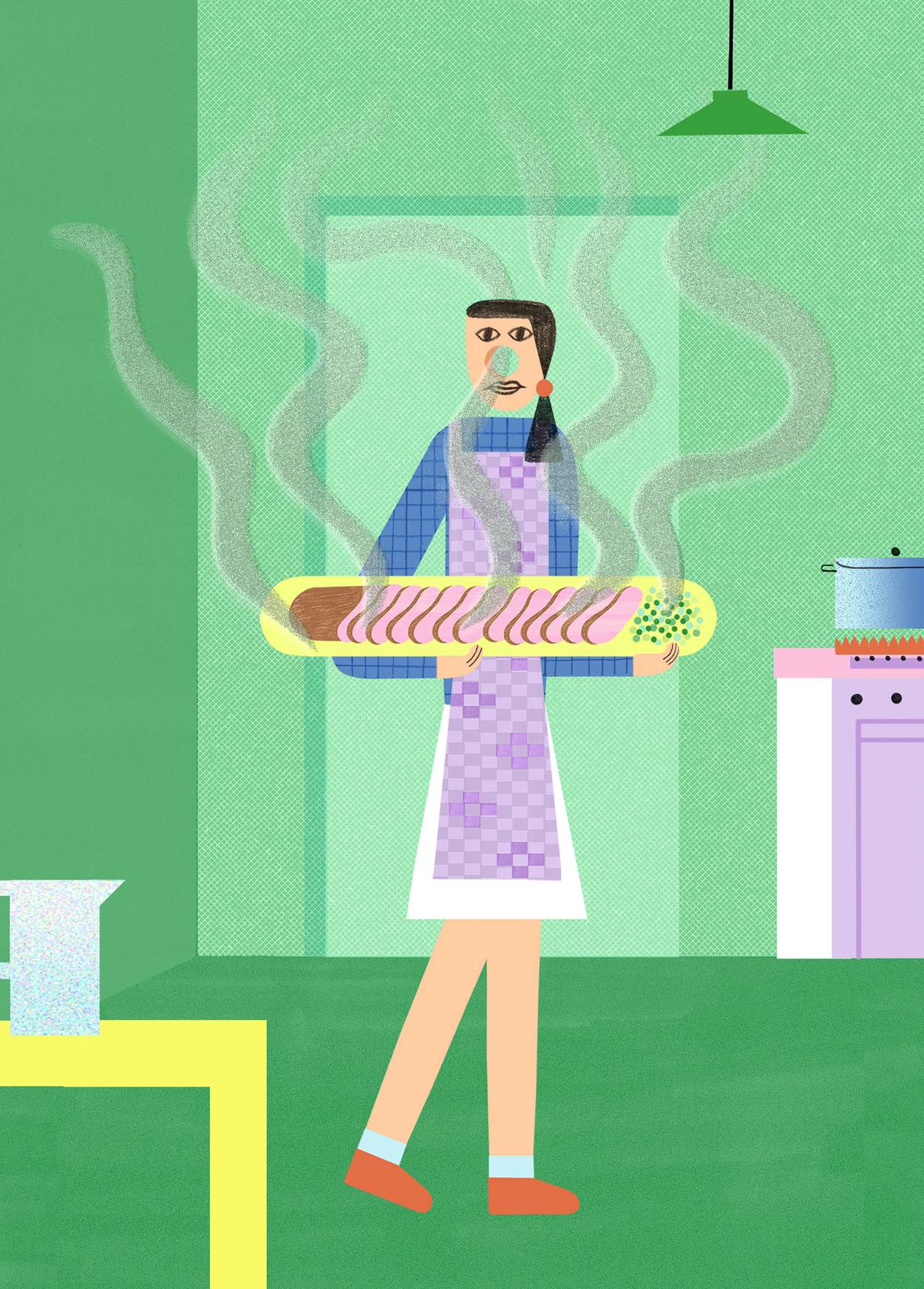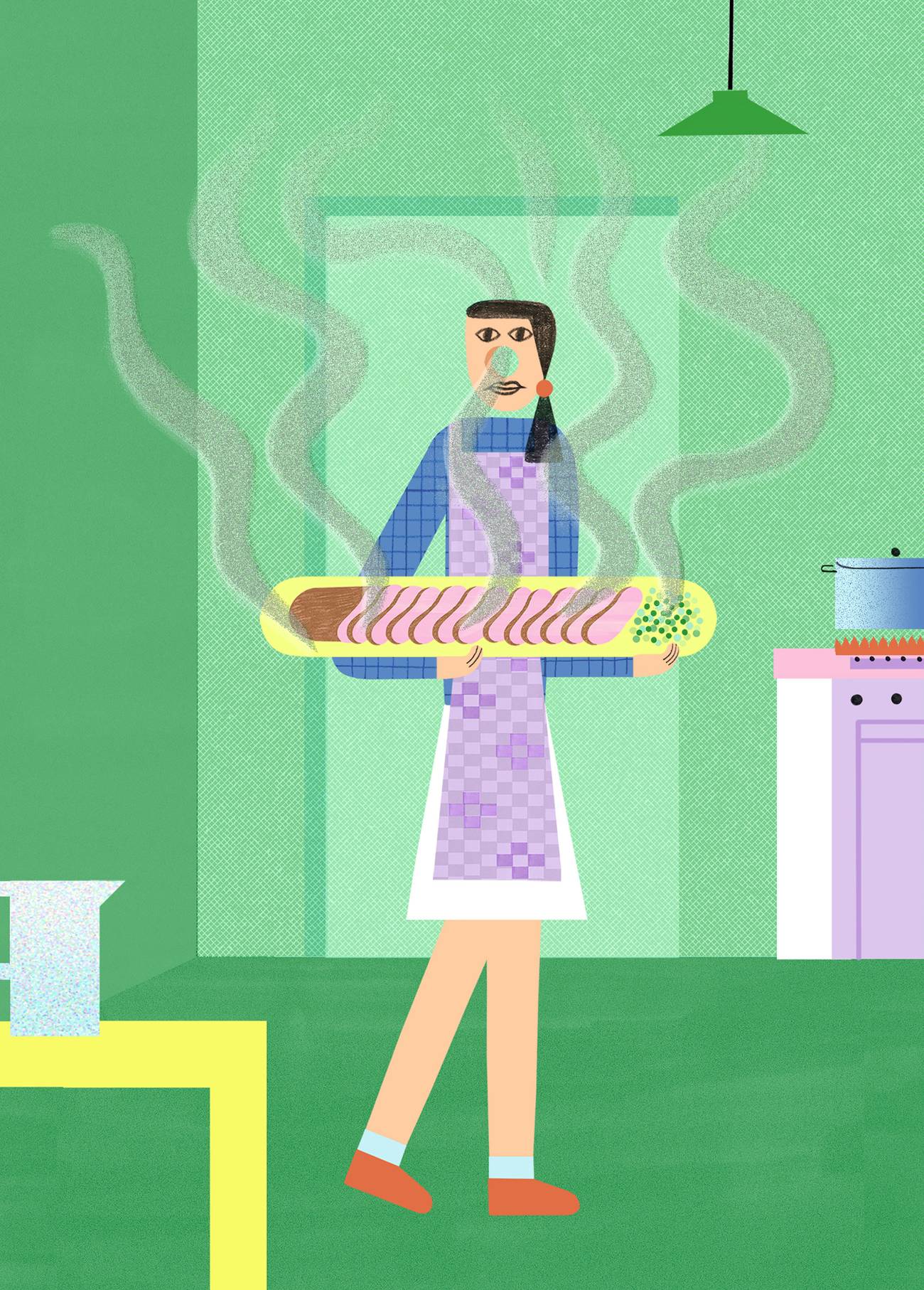Losing My Senses
Since I got COVID-19 three years ago and lost my ability to smell or taste anything, I’ve had to reevaluate my connection to Jewish cooking




What is it from which the soul derives benefit and the body does not derive benefit from it? You must say: That is scent.
—Talmud, Tractate Berachot 43b
I was rushed to the emergency room with “the flu” on Jan. 28, 2020, when I was 19. The doctor jokingly asked if I had been to Wuhan recently and then we all laughed over the thought of me having COVID-19, that new disease that was starting to make the news.
I haven’t been able to smell anything since then.
Until I realized that I had, in fact, contracted COVID-19—told by a doctor that summer that I presented all the symptoms of long COVID—I blamed my loss of smell on this, that, and the other thing: No one is able to smell great when they’re sick, and every college student feels shitty for months between campus colds and frat flu and the people coughing in communal restrooms at any given minute between the months of December and March. I felt like there was an end in sight—because there had to be.
I continued to make little Friday night meals for my friends, experimenting with new chicken recipes or chocolate cakes with exorbitant amounts of margarine. Losing my sense of smell did not, at first, appear to be the end of the world. I would just set a timer and eye the oven a bit more watchfully (especially after I set my entire kitchen on fire).
Taste was a later loss: Being a habitual eater I did not notice for months that I was not tasting what I was eating. Then, as a test, I was blindfolded by my friends and handed vanilla and chocolate ice cream. Which one is which? I was asked. I could not answer.
I could detect major taste profiles, but not much more. That left me with textures—and in terms of texture, Ashkenazi food is dreadful. What used to proudly center my dinner table now seems too slimy and congealed; without any flavor, it never feels right in my mouth. There is nothing appealing about gefilte fish when it’s flavorless and I’m left chewing what can only be described as gelatinous fish cement.
Since childhood, my Judaism had been based around food—sitting at a table and eating for Shabbat and holidays. It was not thrice-a-week Hebrew school or youth group that had defined me as a Jewish woman, but rather learning how to make (and burn) a brisket and subsequently eating the charred mess. I relished the smells from my mother’s kitchen, equating Friday night brachot with tastes that accompanied each prayer.
When the realization hit that my smell and taste are likely gone for good, my sense of Jewishness felt precarious. How was I supposed to rebuild such a stable part of my identity when I felt the most Jewish sharing a meal with my loved ones? Would I ever feel like that again when I could never enjoy that meal myself? In short: I don’t think I ever will. Losing my sense of taste and smell has forced me to relearn what it means to be Jewish.
For a while after my smell and taste were gone, I resented the act of cooking. My childhood was spent at my mother’s side watching her create works of art in the kitchen and playing sous chef. As an adult who couldn’t smell or taste, offers to make an additional dessert or asks whether I wanted to help were selfishly declined. There was nothing to gain in creating something I couldn’t enjoy myself. I just shook my head and silently raged.
Losing my ability to enjoy food did not ravage my body—in fact, now I’ll gladly eat radishes and kale and other foods that used to make me retch. However, losing my sense of smell and taste has stripped me of more than my senses because the memories have begun to slip as well. I’ve already forgotten how cloves smelled or whether it was the dill or parsley that hit the tongue first in my grandmother’s matzo ball soup. There are days where I am frustrated and angry with my lack of memory and all I want is to enjoy that pizza shop falafel combo. Some days I just sit there and lie to those around me and nod along when a friend points out that New York City wet garbage smell because if I tell myself I can smell it, maybe eventually I’ll believe it.
There is no Mourner’s Kaddish for the intangible. There is no way to commemorate what once defined my Judaism. Simply, all there was left for me to do was just move on.
Three years later, my relationship with Judaism and cooking has transitioned to be more about the act of giving rather than sharing.
Now that I’m out of college and no longer constantly surrounded by friends, the act of sharing is more difficult. Despite sharing a kitchen with fewer people and controlling more fridge space, wrangling dinner companions has become far harder as the responsibilities of adulthood loom. Some days this frustrates me when I must freeze meatballs, eat the same salmon for four days straight, and pick at chicken that I can only discern as sweet.
However, when I manage to convince everyone I know to come eat with me, let me cook for them, taste the brisket, have three slices of quiche, I feel like I’m properly showing my affection toward those I adore. It’s become a fun ritual to give a little spiel about who first made this in my family or what the dish is traditionally served with.
My euphoria has become about the process of making food and educating others rather than enjoying these meals myself, since for a large part I cannot. It has been devastating, but my new tradition makes me feel like I am finally doing what my ancestors would have wanted when they sacrificed everything to flee to the United States. I am loudly and proudly creating Jewish meals in my Jewish home and sharing them with Jewish and non-Jewish friends alike, a smell-less reclamation of these foods of affliction.
As much as I cried and cursed the loss of my taste and smell, it brought me back to the ethics of Judaism rather than the superficial aspects I had thought to be the only thing that kept me Jewish. I still host meals, but the enjoyment has shifted to watching others enjoy Judaism in ways that I cannot. I finally can view others learning about Jewish cooking without kicking myself over something gone wrong. It’s made me love making others love something, and even if I ever get my sense of smell or taste back, I don’t think this feeling will go away, because that is a large part of my Judaism now.
My go-to brisket is one that my mother stopped making because she said it had too many artificial products in it. (That says a lot coming from a woman who will voluntarily eat jellied fish patties from the jar and encouraged me to try ptcha because it was—understandably—the only thing left uneaten at a shiva.) However, people like my brisket with the processed apricot jelly and onion soup mix and I love making it even if I can’t really taste or smell it. I still have the sweet sensation on my tongue of the meat coated with sauce, the tender chew of the beef. That feeling hasn’t changed, and I am so thankful for that.
That orange saucy brisket was the star of the first Shabbat dinner I ever made back when I was 15. Three years after my bat mitzvah, I felt like a Jewish woman, not a Jewish girl, for the first time as I pulled out my brisket (overcooked) mashed potatoes (undermashed), and Brussels sprouts (burned to a crisp). I feel an innate sense of Jewish femininity being in the kitchen and making something that people enjoy.
Almost 10 years after my bat mitzvah, I’ve now figured out how to use a potato masher. Am I good at mashing potatoes? I would probably say no. However, every time I cook for loved ones, I still feel a little closer to my Judaism. So I continue to buy a slab of meat, dress it in all the fixings, pop it in the oven, and wait for someone else to say, “That smells really good.”
Elizabeth Karpen is a New York-based journalist and essayist. Follow her on Twitter @Lizziekarpen.